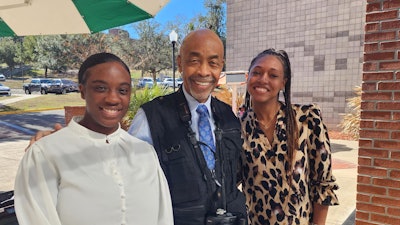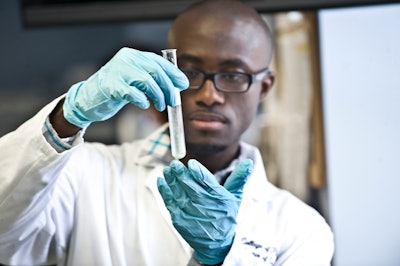While still fighting for official provider status, pharmacists have proven to be crucial in delivering care and helping address healthcare disparities.
COVID-19 has placed unprecedented demands on frontline healthcare workers. Over the past three years, pharmacists have demonstrated that they are vital to addressing pandemic-related issues and bringing care to their communities.
 Students pose with Dr. Johnnie L. Early II, dean of the FAMU College of Pharmacy and Pharmaceutical Sciences.
Students pose with Dr. Johnnie L. Early II, dean of the FAMU College of Pharmacy and Pharmaceutical Sciences.
“Pharmacy has become more diverse in terms of the different opportunities offered to graduates,” says Dr. Margareth Larose Pierre, founding campus dean, director, and professor at the Durell Peaden Jr. Pharmacy Education Center in Crestview, Florida. The center is affiliated with the Florida A&M University (FAMU) College of Pharmacy and Pharmaceutical Sciences.
“We are more clinical, and the patients are more relying on our input in their health,” she continues. “One of the challenges we have is the fact that we’re still fighting to get provider status. Once we have provider status, the impact will be even greater.”
A provider is a licensed person or organization that provides healthcare services, and provider status would enable pharmacists to have more direct involvement in patient care in terms of assessment, diagnosis, and treatment.
Evolving role of pharmacists
“Pharmacists play a big role in the healthcare system,” says Clarissa Ferdinand, a fourth-year student in the Doctor of Pharmacy (PharmD) program at FAMU. “This can further assist with fewer medication errors. I’m looking forward to being on the frontlines to overall improve our patients’ health outcomes.”
In November 2022, the McKesson Foundation, a corporate foundation dedicated to advancing healthcare outcomes for all, awarded $4.1 million to pharmacy schools to help close diversity gaps and improve health outcomes. “The McKesson Foundation believes increasing diverse representation among pharmacists, training all pharmacists in inclusivity and regularly engaging with communities can help reduce healthcare disparities,” says Melissa Thompson, president of the McKesson Foundation and vice president of philanthropic giving. “Underrepresented-in-medicine minorities are more likely to work in communities or settings with medically underserved minority populations.”
McKesson Foundation is partnering with the pharmacy schools to introduce the pharmacist career path to high school and college students; enhance programs to recruit, prepare and support diverse students; build inclusive campus communities; and provide all students with cultural competency and an understanding of and ability to address social determinants of health.
Larose Pierre says some of the important things pharmacy students learn are the diagnostic issues that come into play before a patient’s treatment begins. Both she and Dr. Johnnie L. Early II, dean of the FAMU College of Pharmacy and Pharmaceutical Sciences, say physicians have resisted such involvement from pharmacists.
Ferdinand says she sees a range of career interests among her fellow students. Some are interested in industry or research, while others want to do residency programs, which is postgraduate training that can be general or focused on a specific area of practice such as infectious diseases or geriatrics.
Early notes that there are over 100 career choices that a PharmD prepared person can pursue. When FAMU held a career day, two metrics stood out. Fifty students from the graduating class of 2023 were made offers by Walgreens. Six students received offers from Pfizer. Dr. Jocelyn D. Spates, associate dean of clinical affairs and professor at FAMU, says 58% of the students who applied for residencies were matched with a residency program.
Even though pharmacists don’t have practitioner status, the curriculum in the PharmD program is replete with information about providing direct patient care, says Early, particularly in the experiential years of the program. Spates says it is part of the program’s accreditation standards to ensure that students have direct patient care experience throughout the curriculum.
Howard University College of Pharmacy has both a traditional pharmacy program, which takes six years (the first two years consist of prerequisite courses) and leads to the PharmD, as well as a non-traditional two-year online program for people who previously earned a bachelor’s degree in pharmacy (a degree largely phased out over the past 20 years) and now wish to earn the PharmD to increase their professional options. Dr. Oluwaranti “Ranti” Akiyode, dean of Howard’s College of Pharmacy, says today’s students have an expansive view of the profession of pharmacist, with their potential roles made even more obvious to the public during the pandemic.
“I hope they envision their roles as public health champions,” says Akiyode. “The pandemic has…revealed the value of pharmacists in the community. … Pharmacy teams delivered more than 270 million COVID-19 vaccinations and also averted more than one million pandemic deaths. Those numbers are quite powerful to help us see the impact that pharmacists have in this current healthcare landscape.”
A number of Howard PharmD graduates pursue work in community pharmacies, but others are in hospitals and ambulatory care settings. Akiyode says beyond the vaccines, pharmacists provide medication therapy management and reduce treatment failures and medication problems.
Public health
“The pandemic and the response to it on the health sciences side really highlighted the role of the pharmacists,” Early suggests. “It’s because of the wonderful work that practitioners do despite the limitations.
“There’s a definite role for us because we have a distinct advantage when it comes to understanding medicine…and health status improvement,” he adds.
 A student works in the lab as part of studies in Howard University’s College of Pharmacy.
A student works in the lab as part of studies in Howard University’s College of Pharmacy.
From the outset, Howard students are exposed to direct patient care activities, including simulations and hands-on opportunities in the lab, according to Akiyode, noting that currently only 4.9% of pharmacists are Black.
“We have objective skills clinical education; we have opportunities for them to learn how to work with other healthcare providers to develop teamwork skills,” Akiyode says. “They take a course with medical students and nursing students. They have experiential rotations. … They have hands-on opportunities to talk to patients in the clinic.”
When she was the founding pharmacist at the Howard University Hospital Diabetes Treatment Center (2007–17) Akiyode worked with endocrinologists, nurses and dieticians. Students and pharmacy residents observed her with patients. She says, particularly in public health settings, giving pharmacists practitioner status will increase access to healthcare.
“People from lower socioeconomic status, medically underserved areas, will have access,” says Akiyode. “Allowing us to have more authority can allow us to reach more people. Pharmacists are the most accessible health professionals. Opportunities for us to intervene in the lives of more people, especially those who are in medically underserved areas, we can truly reduce healthcare costs and improve patient outcomes.”
Among pharmacy schools to receive money from the McKesson Foundation is the University of New Mexico, at which all PharmD students are required to complete a four-week Advanced Pharmacy Practice Experience (APPE) rotation in a rural area of the state. The McKesson Foundation is funding a program supporting students who want to complete an additional rural APPE rotation. Funding for the Creating Awareness and Responsiveness through Education program at the University of North Carolina at Chapel Hill will train students to recognize and address healthcare disparities in patients and populations in underserved and rural areas.
“The goal of both programs is to have more students choose to practice in vulnerable or rural communities after graduating,” says Thompson. “New Mexico and North Carolina have the most advanced practice designations. For instance, New Mexico permits pharmacist clinicians to conduct physical assessments, order lab and diagnostic tests and prescribe certain medication therapies.”
Future goals
“Each program we support will have metrics that the partners can track and report,” says Thompson. “We’ll use the data to spotlight programs and their impact internally and externally through our various communications channels.”
With the vast expansion of telehealth over the past three years, it has become part of the education of pharmacy students. Spates has seen pharmacists transition in their careers to areas such as medication therapy management or working with insurance companies. Opportunities have opened with flexible and even remote options.
“The pandemic, as with the nurses as well as physicians, was very stressful on our entire healthcare system, including pharmacists, so a lot have begun to seek opportunities outside of the day-to-day operation in a pharmacy setting,” Spates explains.
“Pharmacists play a vital role in healthcare,” says Ferdinand. “If pharmacists are there on the frontline, in the treatment approach process, a lot of medication errors can be prevented. Ultimately, it can also assist physicians being less burned out. It’s up to pharmacists to assess the medication or decline it.”
Akiyode says there are many factors to healthcare disparities, such as social determinants of health. From a pharmacist’s perspective, it is about access.
“Increasing access to healthcare by having pharmacists be able to do more certainly is a great way,” Akiyode says. “If pharmacists have provider status we can really do more in terms of identifying drug therapy problems and helping individuals be on the right medications. We can have management of diseases — diabetes, high blood pressure, some of the common causes of death of people of color. Having pharmacists have provider status can go a long way to reducing healthcare disparities.”





















